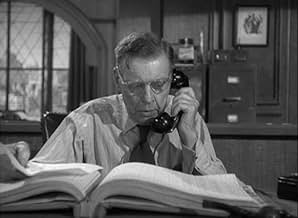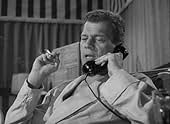Breakdown
- Episode aired Nov 13, 1955
- TV-14
- 26m
William Callew is involved in a bad traffic accident on a rural road, that leaves him so paralyzed he appears lifeless, and when help arrives they think he's really dead.William Callew is involved in a bad traffic accident on a rural road, that leaves him so paralyzed he appears lifeless, and when help arrives they think he's really dead.William Callew is involved in a bad traffic accident on a rural road, that leaves him so paralyzed he appears lifeless, and when help arrives they think he's really dead.
- Guard
- (as Jim Weldon)
Featured reviews
Joseph Cotten plays William Callew, a callous businessman with little regard for human emotion. After a long-time employee weeps uncontrollably after losing his job, Callew unsympathetically condemns his lack of self-control. However, poetic justice is about to ensue. After becoming involved in a ghastly car collision with a truck of chain-gang prisoners, Callew wakes up paralysed from head to toe, but conscious enough to thinking logically. The fleeing prisoners offer hope of rescue, but instead believing him to be dead seize the opportunity to loot his clothing. Despite regaining slight movement in a single finger, nobody seems to recognise that Callew is still alive, and he seems destined to be buried that way. Hitchcock uses point-of-view shots to powerful effect, and Cotten though not called upon to do much in the way of acting delivers a creepy monotone voice-over that communicates his overwhelming paranoia. Though a lesson is proposed by the conclusion, its presence seems to be tongue-in-cheek, with Hitchcock spelling out the necessity of a "moral" in his introduction.
How it finally gets resolved is kind of touching, if, for some, may seem kind of sappy. But Cotten really sells it with his voice and even his face and eyes, frozen as they are, because of how his character is set up and the follow-up happens. This is the kind of material that the Twilight Zone would go for years later, and I mean that as a compliment. It's among Hitch's best work in the 50's, for TV or film.
Really off-beat and well-thought-out premise with fine ironical ending. Don't overlook the first five minutes even though it's an uneventful set-up for what follows. Because there we understand that Cotton really does deserve to suffer some poetic justice, extreme though it is. If you think about it, there's a moral here. Anyway this is one of the initial episodes that really put the series on the TV map and continues to pack a wallop fifty years later.
Did you know
- TriviaThis won Edward W. Williams the 1956 Primetime Emmy for Best Editing of a Television Film.
- GoofsWhen watching current film-transferred versions on a modern definition television, one can see William Callew (Joseph Cotton) blinking his eyes even though it was established earlier that he could not move anything, including his eyelids. This is especially noticeable when the two escaped convicts are moving his body and disrobing him in the car. This would not have been noticeable at the time of first broadcast due to the poor resolution of the televisions.
- Quotes
[last lines]
Alfred Hitchcock: Well, that was a bit of a near thing. He reminded me of my own situation. Imagine, if you can, the terror of being inside a television set, knowing that any moment, the viewer may shut you off, and being powerless to prevent it. And I go through this every week. My only consolation is that some portions of our program are so fascinating, that they hold the viewer spellbound. Such an episode follows immediately. And then I'll be back again.
[commercial break]
Alfred Hitchcock: There, now, that really held you in suspense, didn't it? For more of the same, I recommend you tune in next week at this time. I shall see you, then. Bonsoir.
- ConnectionsFeatured in Nightmares & Dreamscapes: From the Stories of Stephen King (2006)
- SoundtracksFuneral March of a Marionette
Written by Charles Gounod
Details
- Runtime
- 26m
- Color
- Aspect ratio
- 1.33 : 1






















